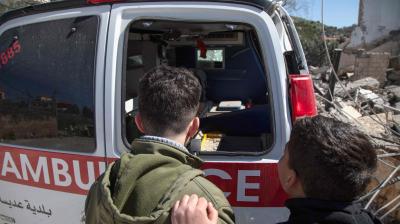Iconic Pak activist Abdul Sattar Edhi dies at 92
Pakistan on Saturday mourned the death of philanthropist Abdul Sattar Edhi, who died here from renal failure on Friday night.
Pakistan on Saturday mourned the death of philanthropist Abdul Sattar Edhi, who died here from renal failure on Friday night.
Ninety-two-year-old Edhi had been suffering from kidney failure since 2013 and was on dialysis. He died after facing respiratory due to his frail health.
The activist was laid to rest on Saturday as thousands attended his funeral prayers in Edhi village as per his last wish. He was accorded a guard of honour and a gun salute by the Pakistan Army. The body, draped in Pakistan’s flag, was taken to Edhi village.
According to his son Faisal Edhi, he could not undergo kidney transplantation due to his advancing years.
PM Nawaz Sharif had announced a state funeral and day of national mourning in honour of the man who owned just two sets of clothes, but whose work in uplifting the nation’s destitute and orphans cemented his place in the hearts of Pakistan’s masses.
President Mamnoon Hussain, Chief of Army Staff General Raheel Sharif, Punjab chief minister Shahbaz Sharif, Sindh chief minister Qaim Ali Shah and Sindh governor Dr Ishratul Ibad, among others, also attended the funeral. The PM announced Edhi would be awarded Nishan-e-Imtiaz posthumously.
Edhi had pledged to donate his body organs. However, due to his long illness, his son has promised to donate only his eyes to any deserving person. Motivated by a spiritual quest for justice, Edhi and his team created maternity wards, morg-ues, orphanages, shelters, and homes for the elderly, picking up where limited government-run services fell short.
His ethos of humanitarianism transcended religious and ethnic lines, but made him the target of many ferocious smear campaigns.
Hardliners branded him an infidel and his work un-Islamic. His response was hardwork and an obstinate asceticism, a bid to leave his enemies with no ammunition. He slept in a windowless room furnished with just a bed, a sink and a hotplate.
Edhi leaves behind his wife Bilquis and four children, including son Faisal Edhi. Born to a family of Muslim traders in Gujarat in British India, Edhi arrived in Pakistan after its creation in 1947.
Edhi, full of idealism and hope, opened his first clinic in 1951 in the heart of Karachi. Abandoned children and the elderly, battered women, the disabled, drug addicts — Edhi’s foundation now houses some 5,700 people in 17 shelters across the country.
The most prominent symbols of the foundation — 1,500 ambulances — are deployed with unusual efficiency to the scene of extremist attacks that tear through Pakistan with devastating regularity. He was so widely respected that armed groups and bandits were known to spare his ambulances.
Meanwhile the foundation’s adoption service sees unwanted children – many of them girls – left in cradles placed in front of every centre, where they can be safely cared for. Edhi had been nominated several times for the Nobel Peace Prize, and appears on the list again this year — put there by Malala Yousafzai, Pakistan’s teenage Nobel laureate. Frail and weak in his later years, he appointed his son Faisal Edhi as managing trustee in early 2016.


















